Six tips for when you’re laid low on your block
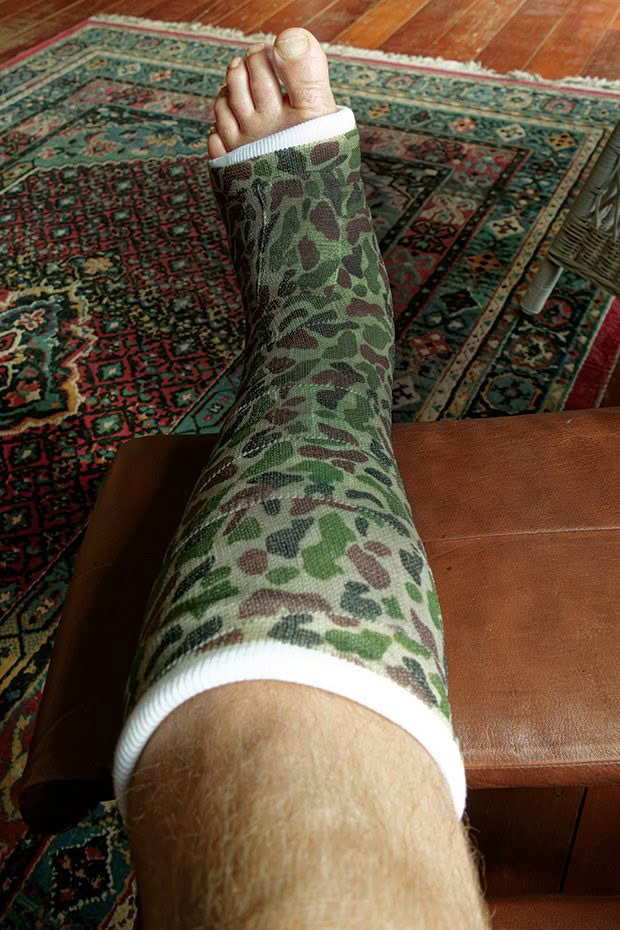
The broken ankle that put me out of action.
When illness and injury strikes, it can leave many critical duties up in the air. Ross Nolly explains how to ensure your block is running smoothly if something unexpected takes you out of commission.
Words and images: Ross Nolly
WHO: Ross Nolly
WHERE: Stratford, 40km south of New Plymouth
WHAT: 1.2 hectares (three acres)
ASSISTANTS: Bob (the cat), Willow and Bella (the kunekune pigs)
As I’ve grown older, I’ve learnt that accidents and illnesses don’t just happen to someone else. I’m smack dab in the firing line, too. I realised this about five years ago, when I contracted a severe case of leptospirosis – a bacterial disease that can cause fever, headache and other symptoms. It put me in hospital for 10 days and severely limited my ability to work on my block for more than two months. I was fortunate enough to have a good friend, Phil, step in and feed my animals and take over block duties for most of the time I was physically debilitated.
The job, however, was far harder than it should have been.
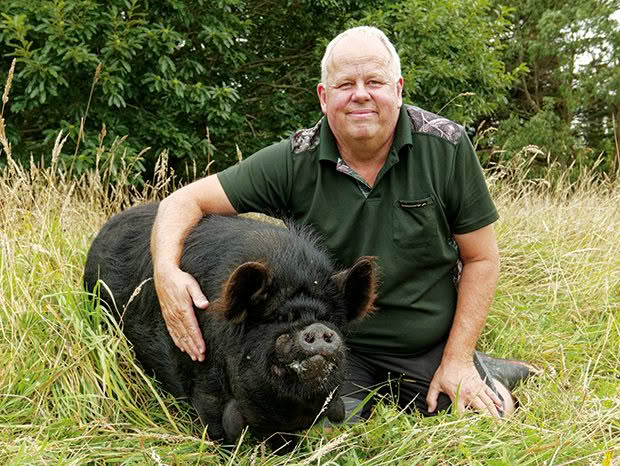
My animals are my mates. It’s my duty to house them well and ensure their security.
Because of the way I had my block running, Phil had to take on some inconvenient and time-consuming tasks. I had no plumbed-in water supply to the chicken coop, so he had to cart buckets of water from taps to top up their water bowls; a considerable hassle for me, let alone someone volunteering their time to help out.
If you have complicated practices, you’ll be worried about how your animals are being looked after while you’re unwell, which isn’t conducive for recovery.
On top of that, I can guarantee that you’ll be feeling bad about the extra workload you’ve given the person helping you out.
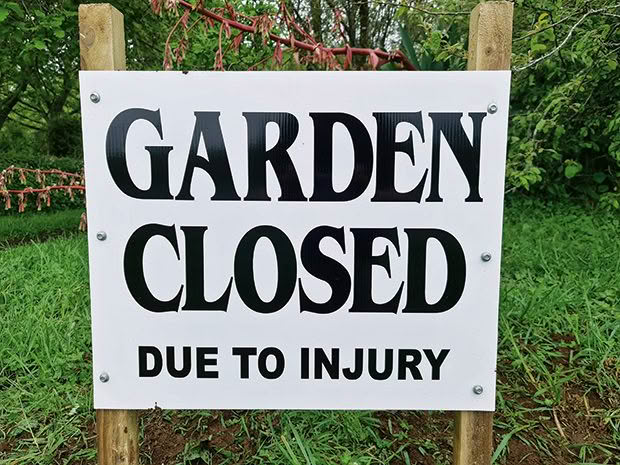
My injury forced me to close my garden for the Taranaki Sustainable Backyards Trail.
It occurred to me I had a duty to be prepared for another incident. Once I was steaming along again on three of my four cylinders, I vowed I would rectify the situation and started making my block run more efficiently for someone other than me to run.
About two years later I broke my ankle and was out of action for six weeks. But fortunately, in between my maladies, I’d made a number of crucial improvements to my property’s infrastructure, allowing my friends to take over my duties and letting me recover in peace. Here are some of the easiest ways you can prepare your block.
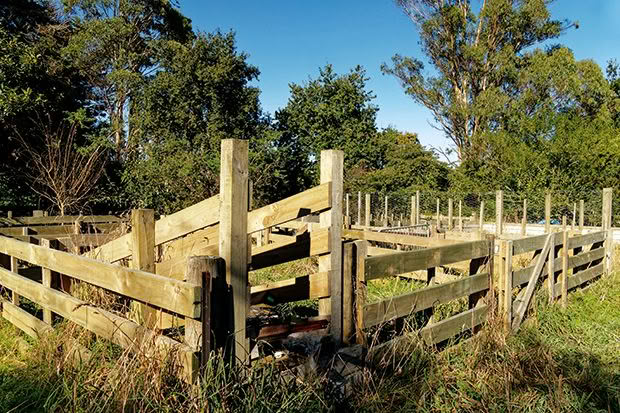
My little “legoland” set of yards and loading ramp that I built for the sheep’s arrival.
1. SECURE BOUNDARIES
Secure boundaries with adequate access are perhaps the highest priority on a lifestyle block, especially if you own goats and other animals whose natural instinct is to roam. But it also makes it far easier for yourself and your ringer to do jobs around the block.
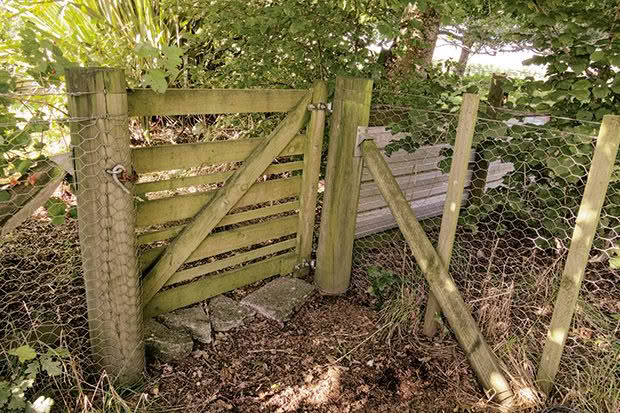
The small gates I installed for easy access between paddocks.
After my illness, I’d built and installed small 1.2-metre gates between, and at the rear, of each paddock. Slipping through these gates eliminated the need to walk to the front of each paddock to get to the neighbouring one, reducing the distance and speeding up my jobs. The gates also make it easier to shift stock between paddocks or into the orchards.
2. SUPPLY AMPLE WATER
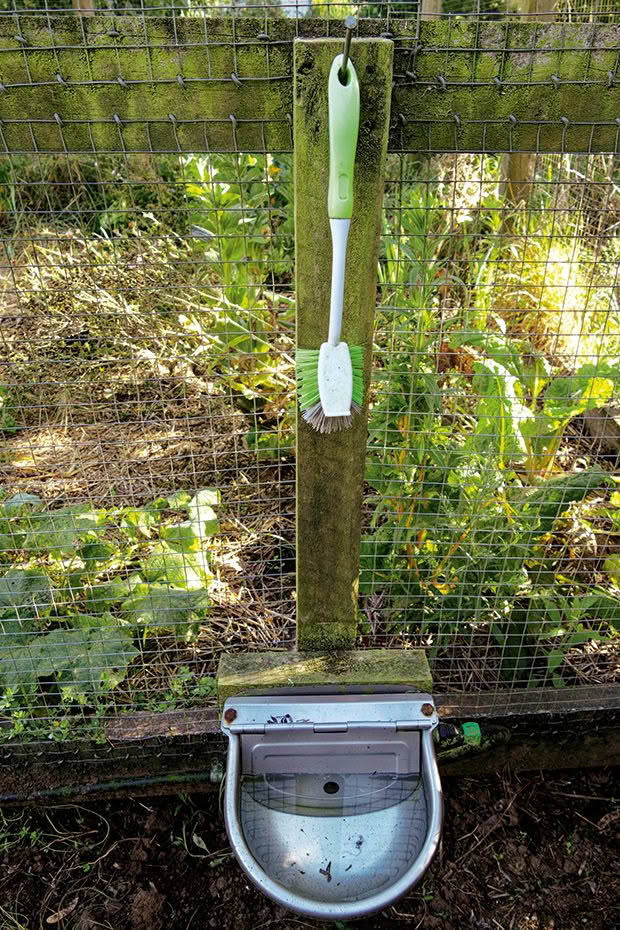
Small changes, like installing a scrubbing brush hook, go a long way to improving your block.
My property doesn’t have water to each paddock yet, but it does to the paddocks that count. The only grazing animals I have are two kunekune pigs. Before I get anything else, I’ll ensure there are water lines and troughs or waterers in each grazing paddock.
After my illness I’d plumbed in waterers in the main chicken pens, which meant Phil no longer had to waste time and effort heaving water in by hand.
3. BUILD ROBUST PENS AND YARDS
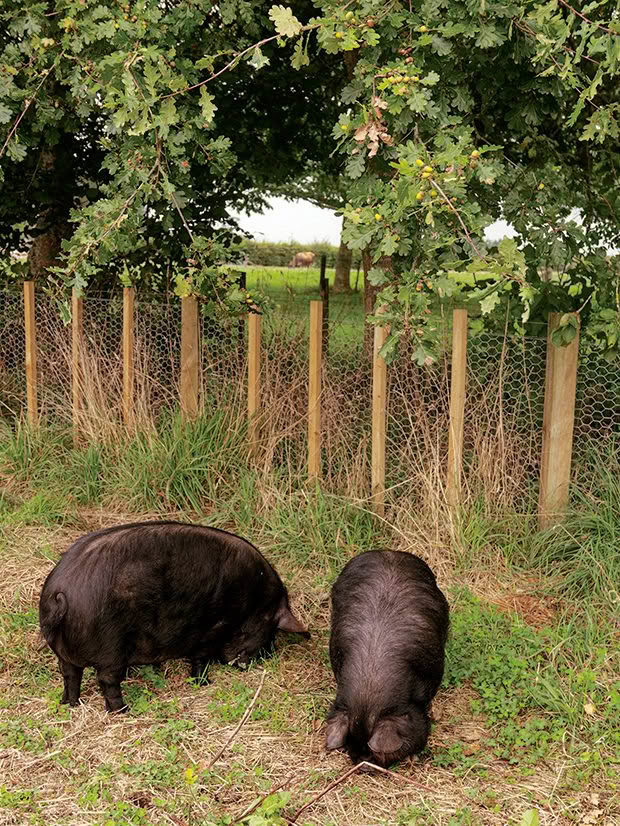
The pigs near a very secure fence. It will be hot-wired soon.
I’ve sometimes been told my animal pens and shelters are over-engineered. But the important factor is they are sturdy, reliable and built for the times when you need the added security, such as during stormy weather.
Robust shelters will ease your helper’s mind because they can go home knowing that your animals are secure and protected. The last thing either of you need to be doing is worrying about whether that wobbly old pallet fence is going to hold up in a storm or when put under pressure by stock.
That’s not to dismiss makeshift structures; they have their uses. I have three chicken houses made from pallets and tarpaulins that are still secure and weatherproof after five years.
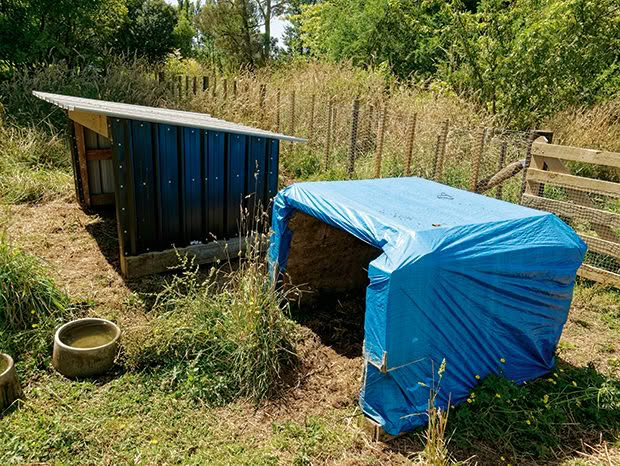
The new pig shelters next to the old pallet-and-tarpaulin ones.
However, the temporary pallet-and-tarpaulin house I built for the pigs when they were young has been replaced by a solid post and iron open-fronted shelter. It protects the pigs from inclement weather and gives them plenty of ventilation. More importantly, it doesn’t look like it’s sitting on an active fault line every time the hefty full-grown pigs scratch their backsides on it.
4. LEAVE INSTRUCTIONS FOR YOUR HELPER
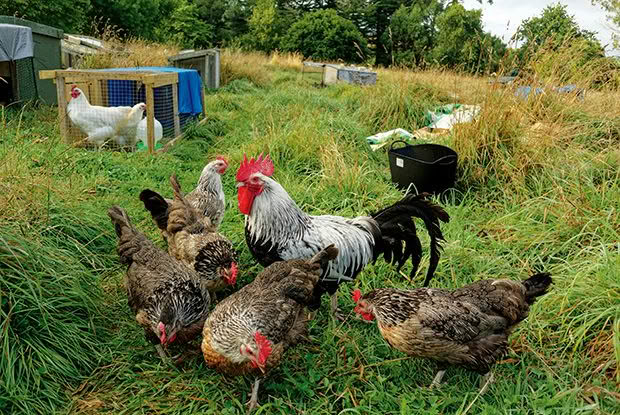
Breeding groups of chickens in multiple pens made my property harder to run when I was ill with leptospirosis.
It may seem overly dramatic, but it pays to walk a potential helper through your property every now and then just in case they’re needed. It’s better to be over-prepared than to leave things to chance.
It can be difficult to explain what needs to be done when you’re miles away in a hospital bed. Always remember that what seems straightforward and obvious to you is a blank slate to someone less experienced or who’s unfamiliar with the property.
Even your significant other may not be hands-on on the property. Again, a walk-through would be highly beneficial instead of throwing them in the deep end when things go pear-shaped.
Have a printout of the seasonal duties, feed amounts and property layout in a safe place or pinned up. It should clearly describe the amounts of feed needed per pen and what tasks need to be done. Give your helper a property layout map with the locations of the water mains taps, electric fence energiser and cut-out switches.
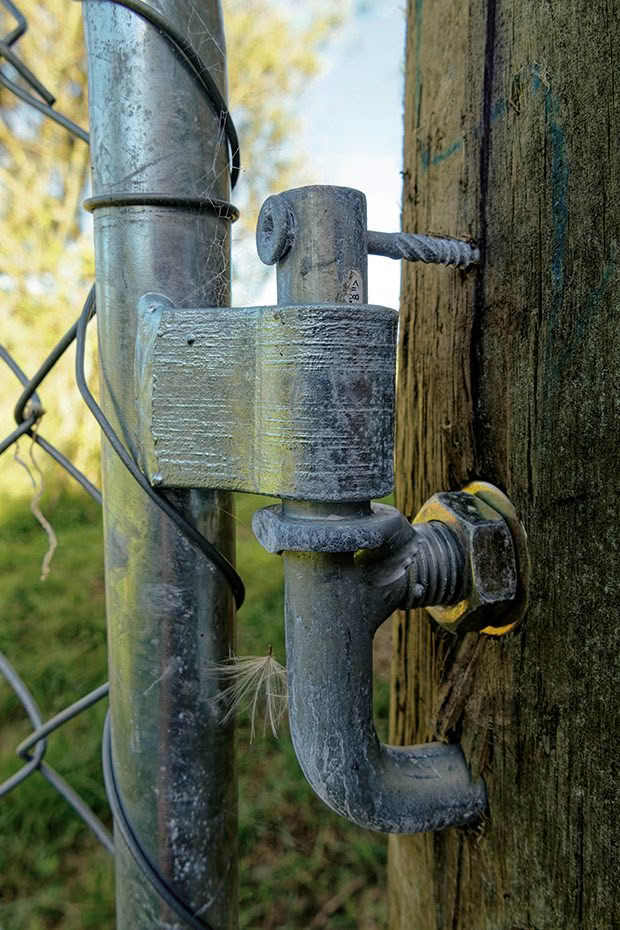
Using “long pin” gate gudgeons with a hole to put a nail or screw through ensures your gate is secure and can’t be lifted off by animals, especially pigs.
Keep tools, fence repair supplies and especially water pipe joiners in a handy spot in case they’re needed. Have a plan in place for when an animal gets loose or is injured, and leave your veterinarian’s phone number in a visible place in case of an emergency.
Always tell your helper that they should ring the vet if they are in doubt about an animal’s health. Vets are usually very accommodating regarding payment if they know you are out of action. For the same reason, it’s important to have a good relationship with your rural supply store.
5. BUILD A SUPPORT NETWORK
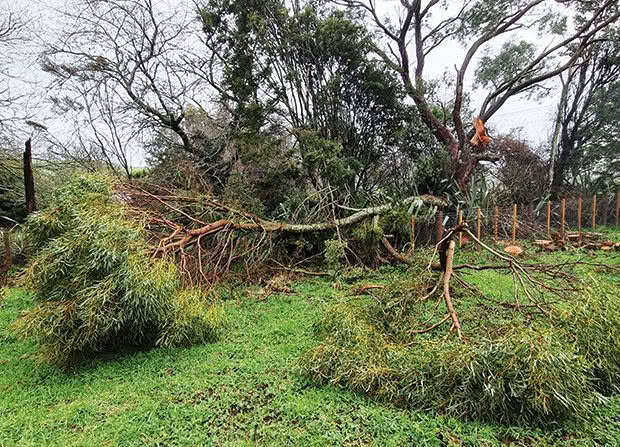
Prepare your property to cope with adverse weather events such as storms by having well-made infrastructure.
Being prepared for an adverse event is vital if you live alone. It also makes it easier to find someone who can look after your property if you want to go on holiday. Get to know your neighbouring block owners and farmers, and try to create a reciprocal relationship. Surround yourselves with a network of solid friends and acquaintances who are prepared to help each other out when needed. Friends who are willing to support you are invaluable. Their assistance also gives you the opportunity to return the favour, without keeping a tally, of course.
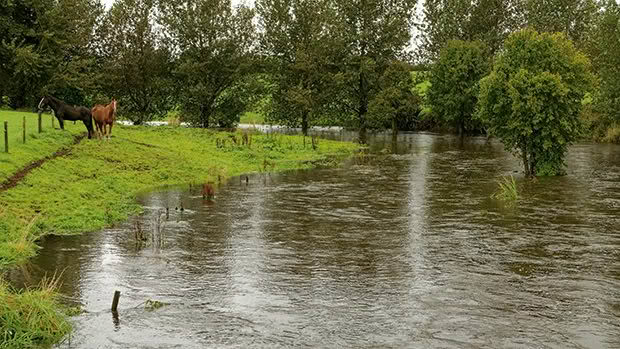
You may be able to assist one of those friends by looking after their property at some stage too. If you learn about the processes on their property, you’ll be prepared to support them when they need it.
6. REDUCE INJURY RISKS
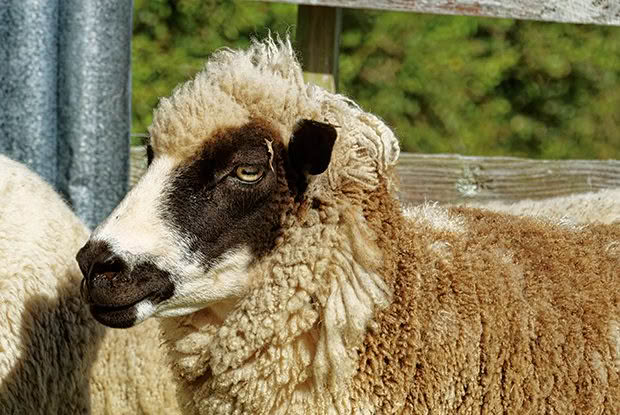
Sheep are great “escape artists”.
Illnesses can sneak up unexpectedly, but it’s essential to try to prevent injuries in the first place. Unexpected accidents occur, but you can be safety conscious without needing to cover your entire property in orange cones.
Accidents often occur due to an “it won’t happen to me” attitude. I once had a near miss while perched up a ladder cutting down a weeping pine that had been dropping limbs onto a fence. It was an incredibly stupid thing to do. I was cutting down the multi-trunked tree in pieces when the 400-millimetre wide, 2.5-metre long trunk I’d cut through swung forward and came flying back towards me like a battering ram.
Fortunately, a pōhuehue vine held it up. It just missed me, but scared me enough to start always looking out for potential hazards, or use an arborist to do dangerous jobs.
But another important reason for reducing risk is that it will allow me to stay on my block for longer. Gates that open easily, no stiles to climb over fences, and other robust infrastructure means I can keep working and living here longer into my dotage.
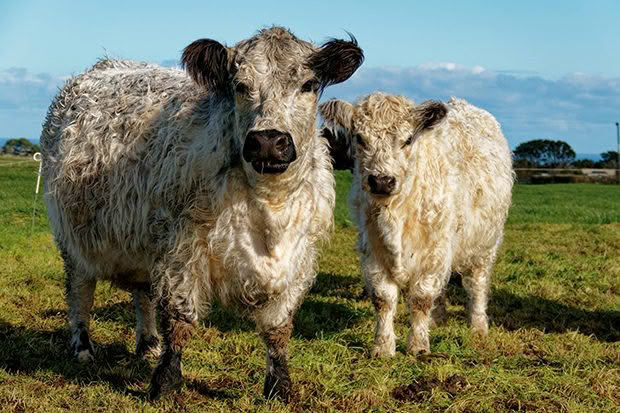
Large animals like cattle can be hard on gates, fences and flimsy infrastructure.
ACC HELP
If you have an injury covered by ACC, you may be able to get support around the home, allowing you to make a quick and safe recovery and get back to your everyday activities. This is assessed on a case-by-case basis by an independent assessor and can be requested anytime.
ACC can provide help with cleaning, looking after your home and with personal tasks such as showering or dressing.
Love this story? Subscribe now!
 This article first appeared in NZ Lifestyle Block Magazine.
This article first appeared in NZ Lifestyle Block Magazine.
